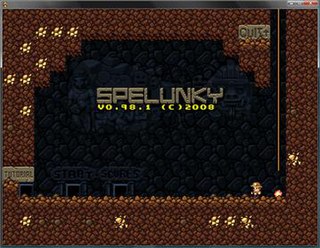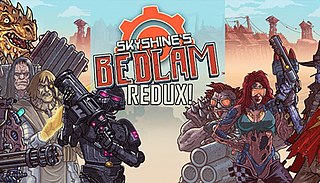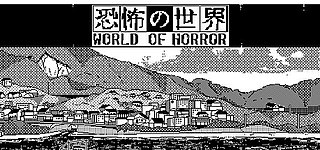
Strange Adventures In Infinite Space is a roguelike video game created by the indie developer Digital Eel and released for Windows and Mac on March 15, 2002, by boardgame developer-publisher, Cheapass Games. Releases for Pocket PC and Palm by British developer-publisher Astraware followed. In 2020, the game was updated to run on current computer operating systems of the day. It remains free to download and share.

Spelunky is a 2008 source-available 2D platform game created by independent developer Derek Yu and released as freeware for Microsoft Windows. It was remade for the Xbox 360 in 2012, with ports of the new version following for various platforms, including back to Microsoft Windows. The player controls a spelunker who explores a series of caves while collecting treasure, saving damsels, fighting enemies, and dodging traps. The caves are procedurally generated, making each run-through of the game unique.

Miasmata is a survival indie video game developed by brothers Joe and Bob Johnson under the studio name IonFX. It was released on November 28, 2012 on the digital distribution platforms GOG.com and Steam, as part of their Steam Greenlight program. In the game, players assume the role of Robert Hughes, a plague-stricken scientist, as he explores a seemingly uninhabited island, seeking out medicinal plants in an attempt to find a cure.

Skyforge is a free-to-play massively multiplayer online role-playing game developed by Allods Team in collaboration with Obsidian Entertainment, and published by My.com. Set on the planet Aelion, Skyforge fuses elements of Science fiction and fantasy in its visuals and storytelling, and sees players exploring the world as an immortal who must strive to become a god and defend the planet from alien invasion from other worlds. The project started development in 2010 and received an open release for Microsoft Windows in July 2015, with PlayStation 4 and Xbox One releases following in 2017. The latest major content update, "Ignition", was released on all platforms in September 2019. A Nintendo Switch version was released in February 2021.
Steve Jackson's Sorcery! is a series of interactive fiction adventure video games developed by Inkle for iOS, Android, Windows, PlayStation, Xbox, and Nintendo Switch, first released on May 2, 2013. The games are based on Steve Jackson's Sorcery! gamebook novels: a four-part spin-off series of the larger Fighting Fantasy series.

Convoy is a video game released on April 21, 2015 for Microsoft Windows and Mac, and as Convoy: A Tactical Roguelike on April 8, 2020 for PlayStation 4 under a revised format. The game features pixel art graphics and roguelike squad based tactical combat. In Convoy, the player must scour the wastelands of a desert planet in a defensively outfitted semi-trailer truck for parts to a crashed spaceship. The plot is experienced through interactive text based dialogue, where the player picks responses to written scenarios. The outcome of these scenarios sometimes turns in to tactical combat.

Star Control: Origins is an action-adventure game developed and published by Stardock Entertainment for Microsoft Windows, released September 20, 2018.

Skyshine's Bedlam is a turn-based tactical roguelike and simulation game developed by Skyshine Games and published by Versus Evil. It was released on September 16, 2015, for Windows and Mac OS X.

Streets of Rogue is a roguelite video game developed by Matt Dabrowski and published by tinyBuild for Linux, macOS, Microsoft Windows, Nintendo Switch, PlayStation 4, and Xbox One. It was initially launched in early access during 2017, and was fully released on July 12, 2019.

Space Hulk: Tactics is a turn-based tactics video game developed by Cyanide and published by Focus Home Interactive. The game is set in the Warhammer 40,000 universe and is based upon the turn-based strategy tabletop miniatures board game Space Hulk. The game was released on 9 October 2018.
A roguelike deck-building game is a hybrid genre of video games that combines the nature of deck-building card games with procedural-generated randomness from roguelike games.

Caves of Qud is an early access roguelike role-playing video game developed by American studio Freehold Games set in an open world that is partially pre-made and partially randomly generated. The game takes place in a post-apocalyptic science fantasy setting and is inspired by the pen-and-paper role-playing games Gamma World and Dungeons & Dragons.

The Lord of the Rings: Gollum is an action-adventure game developed by Daedalic Entertainment, who also published the game with Nacon. The game, set in the fictional world of Middle-earth created by J. R. R. Tolkien, takes place in between the events of The Hobbit and The Fellowship of the Ring. The player controls Gollum through a series of locations, such as Cirith Ungol, Barad-dûr, and Mirkwood, as he attempts to find Bilbo Baggins and retake the One Ring whilst battling and avoiding Sauron.

World of Horror, also known by its Japanese title Kyōfu no Sekai (恐怖の世界), is a role-playing video game with a 1-bit pixel art style inspired by the works of H. P. Lovecraft and Junji Ito. The game was created by Polish developer Paweł Koźmiński and published by Ysbryd Games. It was released into early access on February 20, 2020 through Steam, GOG.com, and Microsoft Store. The full game was released on October 19, 2023 for existing macOS and Windows platforms. It was released on October 26 for Nintendo Switch, PlayStation 4, and PlayStation 5.

Star Traders: Frontiers is a hybrid space trading and tactical role-playing game designed by Trese Brothers, a two-man independent video game studio. Players control a spaceship captain in an open world setting.

Jupiter Hell is a roguelike video game developed by ChaosForge and published in 2021 by Hyperstrange. It is a spiritual successor to DRL and adapts first-person shooter gameplay to a tactical roguelike.














